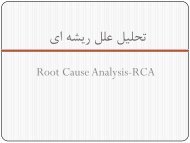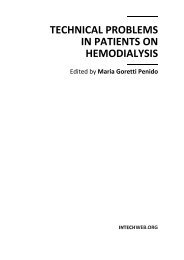new insights into the prevention and treatment of bulimia nervosa
new insights into the prevention and treatment of bulimia nervosa
new insights into the prevention and treatment of bulimia nervosa
You also want an ePaper? Increase the reach of your titles
YUMPU automatically turns print PDFs into web optimized ePapers that Google loves.
Gastrointestinal Aspects <strong>of</strong> Bulimia Nervosa<br />
4. Stomach<br />
Gastric capacity increases in <strong>bulimia</strong> <strong>nervosa</strong>, presumably as a result <strong>of</strong> repeated large<br />
volume binge-eating episodes. This may be associated with an absence <strong>of</strong> satiety signals<br />
until a large amount <strong>of</strong> food has been ingested. A decrease in gastric emptying rate is also<br />
been found in bulimic patients, as well as lower amplitude <strong>of</strong> antral contractions.<br />
Acute gastric dilation has rarely been reported in <strong>bulimia</strong> <strong>nervosa</strong>. It is usually accompanied<br />
by pain <strong>and</strong> discomfort. Stomach (or oesophageal) perforation is a complication, which has a<br />
high mortality, <strong>and</strong> occurs in two situations. Firstly, it may occur in a patient with<br />
unrecognized acute gastric dilatation who continues to eat or binge. The thin gastric wall<br />
continues to dilate <strong>and</strong> eventually tears. The result may be an acute abdomen with subdiaphragmatic<br />
air observed on an erect abdominal or chest X-ray. Alternatively, <strong>the</strong>re may<br />
be a relatively silent oesophageal tear with air observed in <strong>the</strong> mediastinum on <strong>the</strong> chest Xray.<br />
The condition is an acute surgical emergency requiring immediate laparotomy <strong>and</strong><br />
repair. Secondly, it may occur in a patient, who may be <strong>of</strong> normal weight, who is unable to<br />
vomit following a binge-eating episode <strong>and</strong> suffers a gastric or oesophageal (Mallory-Weiss)<br />
tear. The cause appears to be strenuous attempts to vomit, which expose <strong>the</strong> stomach to<br />
extreme strain <strong>and</strong> rupture.<br />
5. Bowels<br />
Bulimic patients <strong>of</strong>ten abuse laxatives; indeed, patients believe that laxatives prevent<br />
absorption, having observed solid food appear in <strong>the</strong>ir stools, although it has been showed<br />
that laxatives have no detectable effect on <strong>the</strong> absorption <strong>of</strong> liquid nutrients. Stimulant<br />
laxatives are most frequently used, because <strong>the</strong>y are fast-acting <strong>and</strong> reliable way to produce<br />
watery diarrhoea; <strong>the</strong>refore <strong>the</strong> effects <strong>of</strong> laxative abuse include diarrhoea, steatorrhea, <strong>and</strong><br />
general malabsorption <strong>of</strong> nutrients. Irritable bowel syndrome type symptoms may be<br />
present. Colonic damage is mainly <strong>the</strong> result <strong>of</strong> prolonged abuse <strong>of</strong> laxatives, which have<br />
been shown to cause degeneration <strong>of</strong> <strong>the</strong> colonic autonomic nerve supply. The urgent<br />
presentations <strong>of</strong> colonic dysfunction are due to <strong>the</strong> weak, atonic cathartic colon. This can<br />
present as volvulus, prolapse <strong>of</strong> <strong>the</strong> rectum through <strong>the</strong> anus <strong>and</strong> intractable constipation.<br />
Any <strong>of</strong> <strong>the</strong>se problems, if severe enough, can require surgery <strong>and</strong> sometimes colectomy.<br />
Mouth to caecum <strong>and</strong> total gut transit times are significantly prolonged, as is colonic transit<br />
time. This slowing, in addition to gastric delay, may also contribute to prolonged satiety by<br />
producing long-lasting feelings <strong>of</strong> general abdominal fullness.<br />
Constipation is extremely common, mainly due to dehydration. Recommended <strong>treatment</strong> to<br />
avoid constipation is regular food intake, adequate fluids <strong>and</strong> exercise.<br />
Laxative abuse carries also <strong>the</strong> acute complication <strong>of</strong> electrolyte <strong>and</strong> fluid disturbances <strong>and</strong><br />
can be particularly dangerous in low weight individuals. Abrupt cessation <strong>of</strong> laxatives in<br />
those who are taking <strong>the</strong>m regularly can result in reflex fluid <strong>and</strong> sodium retention, <strong>and</strong><br />
consequent weight gain, <strong>and</strong> oedema. This can increase patient anxiety <strong>and</strong> reluctance to<br />
curtail <strong>the</strong> use <strong>of</strong> laxatives. To avoid this effect a gradual reduction in laxative use is advised<br />
(National Collaborating Centre for Mental Health, 2004).<br />
6. Pancreas<br />
Fasting <strong>and</strong> binge eating foods high in refined carbohydrates, especially if vomiting follows<br />
this, can lead to high levels <strong>of</strong> insulin release by <strong>the</strong> pancreas with large fluctuations in<br />
35







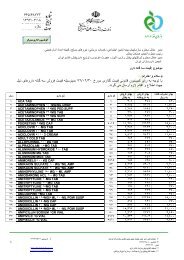
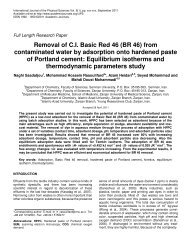

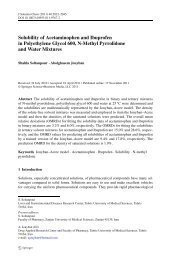
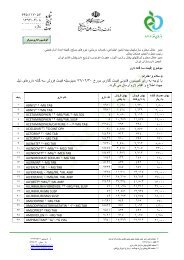

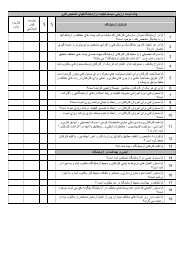
![focuspdca.ppt [Compatibility Mode]](https://img.yumpu.com/22859457/1/190x146/focuspdcappt-compatibility-mode.jpg?quality=85)
